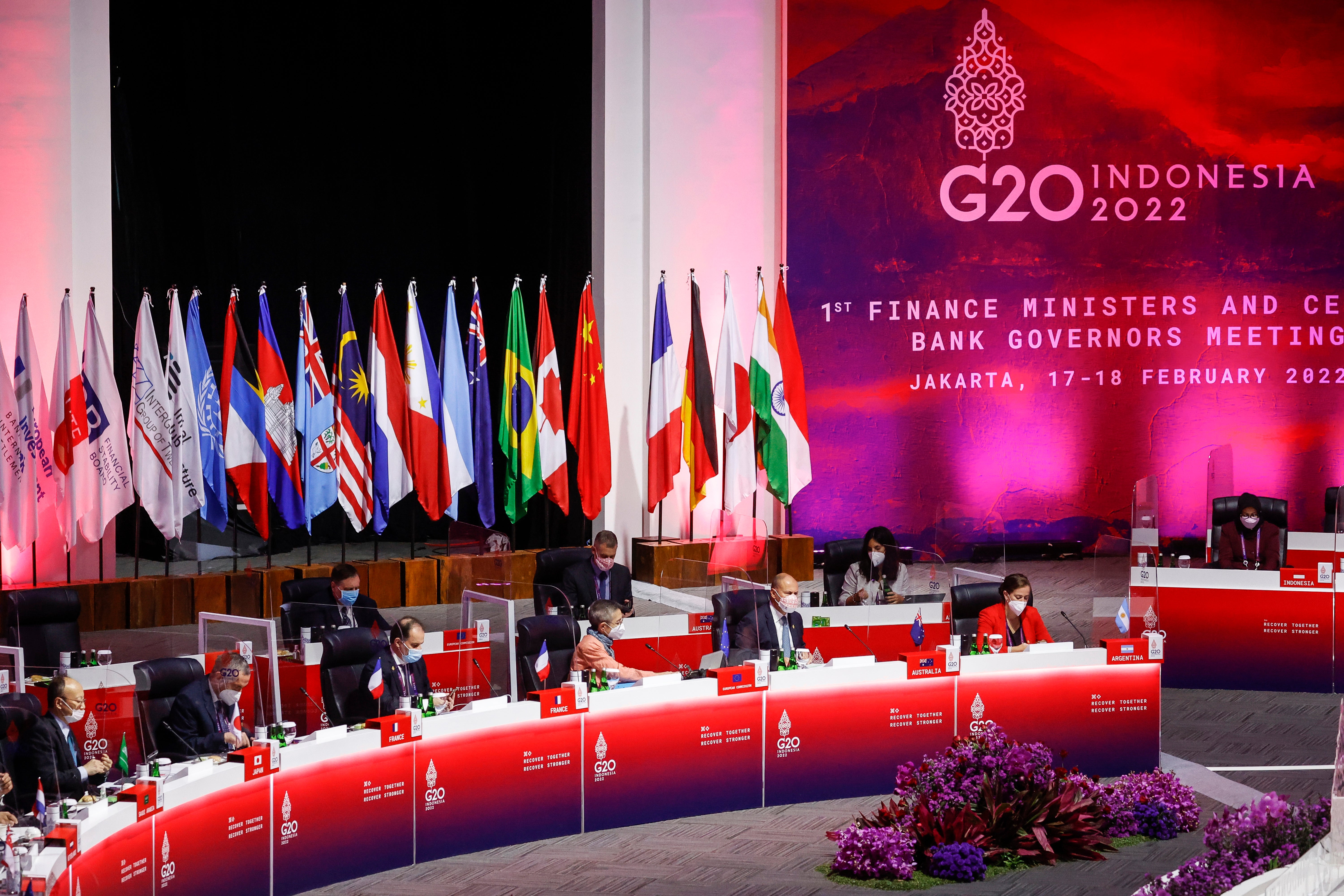G-20 finance leaders eye ways to support pandemic recovery
Indonesian President Joko Widodo told financial leaders of the Group of 20 industrial economies that countries must avoid tensions and cooperate to support a recovery from the pandemic

Your support helps us to tell the story
From reproductive rights to climate change to Big Tech, The Independent is on the ground when the story is developing. Whether it's investigating the financials of Elon Musk's pro-Trump PAC or producing our latest documentary, 'The A Word', which shines a light on the American women fighting for reproductive rights, we know how important it is to parse out the facts from the messaging.
At such a critical moment in US history, we need reporters on the ground. Your donation allows us to keep sending journalists to speak to both sides of the story.
The Independent is trusted by Americans across the entire political spectrum. And unlike many other quality news outlets, we choose not to lock Americans out of our reporting and analysis with paywalls. We believe quality journalism should be available to everyone, paid for by those who can afford it.
Your support makes all the difference.Countries must avoid tensions and cooperate to support a recovery from the pandemic as it lingers in many parts of the world, Indonesian President Joko Widodo told a gathering of top financial leaders of the world's largest economies Thursday.
“The winter is coming," Widodo said in welcoming finance ministers and heads of central banks of the Group of 20 industrial nations.
“The pandemic is far from over, and the global economy is struggling," he said. “During this situation, no single country could recover alone. All countries are interconnected, no one is isolated."
The G-20 financial gathering comes as many economies are treading a precarious path between raising costs of borrowing to cool inflation and helping to support recoveries from the pandemic.
Worries over potential conflict in Ukraine are an added unwelcome source of uncertainty, Widodo said, warning against antagonisms at this time.
“It is not the time to create new tensions that could affect global recovery, let alone jeopardize the world peace as we’ve currently seen in Ukraine," he said. “It is necessary that every party puts an end to rivalry and frictions."
Officials were attending the meetings both in person and online, given troubles with travel and quarantines due to outbreaks, mostly of the omicron variant of coronavirus, that are plaguing many countries.
Host Indonesia is among many countries in Southeast Asia that have endured severe waves of infections, though vaccinations have helped quell the worst of outbreaks.
The fourth most populous nation with 274 million people, it has reported nearly 5 million cases and 145,622 deaths. In the past month, 690,518 new cases have been reported.
Indonesia is the world's 10th largest economy and is located in the fastest growing region — at least before the pandemic swept the world, disrupting business and travel while killing nearly 6 million people.
Surging prices for food and energy are among the challenges the financial leaders confront as they discuss how to best nurture a global economic recovery, Indonesian Finance Minister Sri Mulyani Indrawati told G-20 participants.
“Inflation risk remains skewed to the upside, driven by supply chain disruption, labor market mismatches, wage pressure, and higher energy prices,” she said, adding that such problems have been “more persistent than previously expected.”
The International Monetary Fund has forecast that world economic growth will slow to 4.4% in 2022 from 5.9% in 2021, following a 3.3% contraction in 2020.
Mulyani emphasized the need for coordination between countries in different stages of recovery.
The U.S. Federal Reserve is pulling back on massive support for markets and businesses, preparing to raise interest rates as soon as next month to cool inflation that jumped to 7.5% in January — the highest rate in 40 years.
Consumer prices rose to a record 5.1% in the 19 countries that use the euro last month and to a nearly 30-year high in the United Kingdom.
Indonesia's central bank has also moved to curb inflation. But some other economies have yet to bounce back from the havoc caused by the pandemic.
“Countries’ domestic macroeconomic policy may also cause adverse impacts for other economies," Mulyani said. “In this regard, global coordination, including a discussion on exit strategy will be critical."
Meanwhile, she noted that ensuring countries have equitable access to vaccines remains an urgent priority for limiting new virus variants and ending the pandemic.
___
AP Business Writer Elaine Kurtenbach in Bangkok and Edna Tarigan in Jakarta contributed.